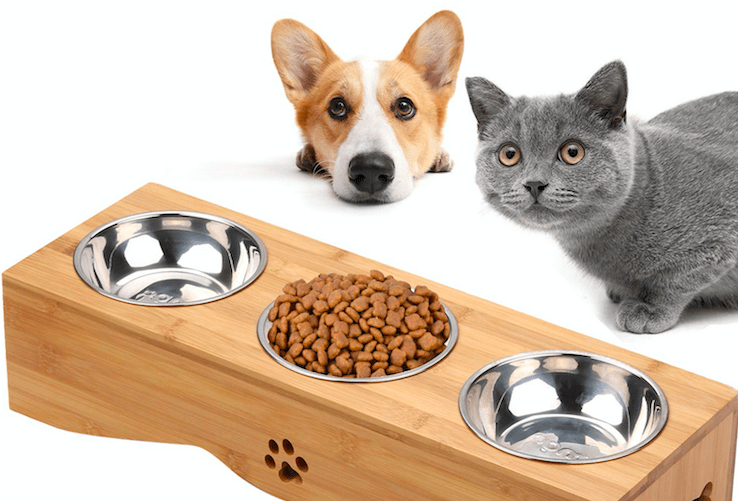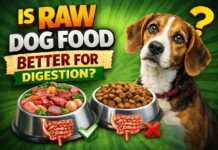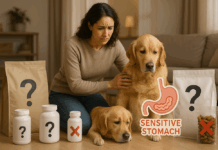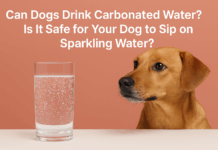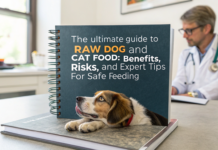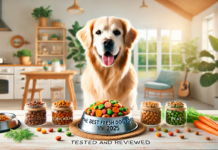Last Updated on March 31, 2024 by Dogs Vets
Can Cats Eat Dog Food? – The Difference Between Dog And Cat Food
In the bustling world of pet care, the question “Can cats eat dog food?” emerges frequently among cat owners. This query reflects a common scenario in multi-pet households and sparks curiosity in those seeking to understand the dietary needs of their feline friends.
As pet owners, we all want the best for our furry companions. This includes providing them with the best nutrition possible.
It’s common knowledge that cats and dogs have different dietary requirements, but what happens when your curious feline friend tries a bite of your dog’s food?
This comprehensive guide delves into the heart of this question, offering insights into the dietary distinctions between cats and dogs, the implications of feeding dog food to cats, and practical advice for pet owners.
Can cats eat dog food?
Is dog food good for cats?
The short answer to whether or not cats can eat dog food is “yes!, but only in an emergency or for a short period of time. This is because cats and dogs have different nutritional needs.
Dog food are most-likely going to lacks the vital nutrition that cats need for a long, healthy life. Cats are carnivores, which means they eat only meat.
Dogs are omnivores, which means they eat meat, grains and vegetables. Therefore, they need a more varied diet than meat alone to meet their nutritional needs.
Before we get into the details of why your cat can’t eat dog food forever, it’s important to start with the basics of cat nutrition and the difference between the nutritional needs of cats and dogs.
Understanding the Nutritional Needs of Cats and Dogs
To grasp why the interchangeability of cat and dog food is a matter of concern, it’s essential to understand the fundamental nutritional differences between these two beloved pets.
Cats are obligate carnivores, requiring a diet predominantly composed of meat to thrive.
They need specific nutrients such as taurine, arachidonic acid, and vitamin A, which are naturally found in animal tissue. Dogs, however, are omnivores and can digest a broader range of food, including vegetables and grains, alongside meat.
What’s the Difference Between Cat and Dog Food?
The fundamental difference between cat and dog food lies in their nutritional composition, which is tailored to meet the distinct dietary requirements of cats and dogs based on their biological and physiological needs.
Here’s a breakdown of the key differences:
Nutritional Requirements
- Protein Content: Cats require a higher protein content than dogs. As obligate carnivores, their diet must consist largely of meat, whereas dogs, being omnivores, can have a more varied diet that includes fruits, vegetables, and grains in addition to meat.
- Essential Amino Acids: Taurine and arginine are critical amino acids for cats, which dog food typically lacks in the necessary quantities.Cats cannot synthesize these amino acids on their own.
Taurine deficiency, for instance, can lead to serious health issues in cats, including heart disease and blindness. Dogs can produce taurine and arginine internally, so their food doesn’t need to be supplemented with these amino acids.
Vitamins and Fatty Acids
- Vitamin A: Cats need a direct source of vitamin A in their diet because they cannot convert beta-carotene (found in plants) into vitamin A. Dog food generally has less vitamin A than cat food because dogs can make this conversion.
- Arachidonic Acid: This is an essential fatty acid for cats, necessary for various bodily functions, including proper skin and coat health, fertility, and kidney function. Cats must get arachidonic acid from their diet, whereas dogs can synthesize it from vegetable oils.
Energy Content
- Caloric Density: Cat food tends to be more calorie-dense than dog food to match their higher metabolic rate. This is because cats use protein for energy, which requires more calories.
Physical Form and Size
- Kibble Size and Texture: Cat food is typically smaller and softer than dog food, making it easier for cats to eat and digest. This difference also caters to the distinct dental health needs of cats and dogs.
Taste and Appeal
- Flavor Profiles: Cats have fewer taste buds than dogs and lack the ability to taste sweetness, which influences the flavor profiles that cat foods aim to achieve.Cat food is often richer in animal proteins, which is more appealing to cats, while dog food might contain a broader range of flavors from both animal and plant sources.
Why These Differences Matter
Feeding cats dog food on a long-term basis can lead to nutritional deficiencies and health issues because dog food does not meet the specific nutritional needs of cats.
Conversely, dog food lacks the precise balance of nutrients dogs require for their health, which can lead to its own set of issues if a dog is fed cat food.
It’s crucial for pet owners to understand these differences and feed their pets food that is formulated specifically for their species to ensure their health and well-being.
The Risks of Feeding Dog Food to Cats
While an occasional nibble of dog food won’t immediately harm a cat, consistent feeding can lead to nutritional deficiencies and health issues.
Dog food lacks the essential nutrients cats require in high quantities, such as taurine, which is crucial for heart health and eyesight. A diet deficient in these nutrients can lead to serious health problems for cats, including heart disease and blindness.
Behavioral Considerations and Solutions
Cats might be drawn to dog food out of curiosity or boredom. Ensuring your cat has a stimulating environment and feeding them a balanced, appealing cat food can help mitigate this curiosity. It’s also advisable to feed pets in separate areas to avoid cross-feeding.
Alternatives and Preventive Measures
The market offers a variety of cat foods tailored to meet their specific nutritional needs across different life stages.
Investing in high-quality cat food and establishing a feeding routine can prevent your cat from developing an interest in dog food.
For multi-pet households, keeping dog and cat feeding stations separate and supervising meal times can help maintain dietary boundaries.
What If Your Cat Accidentally Eats Dog Food?
If your cat accidentally eats dog food, there’s generally no need for immediate concern if it’s a one-time occurrence. Dog food isn’t toxic to cats, but it’s not formulated to meet their specific nutritional needs.
If you find yourself in an emergency situation where you forgot to stop by the store to pick up more cat food for your pet, and you only have dog food left in the house, it is okay to let your cat to eat the dog food, Dr. Ochoa says. And if your cat in some-way takes a few pieces of food from your dog’s bowl, there’s no need to worry, she adds.
Here’s what you should consider if your cat snacks on dog food:
Short-term Effects
- No Immediate Harm: An occasional nibble of dog food won’t harm your cat. Most cats won’t experience any adverse effects from a single small ingestion of dog food.
- Possible Digestive Upset: Some cats may have a sensitive stomach, and eating dog food might cause minor digestive issues, such as diarrhea or vomiting, especially if they’re not used to it.
Long-term Effects
- Nutritional Deficiencies: Regular consumption of dog food can lead to nutritional deficiencies in cats. Essential nutrients lacking in dog food, like taurine, vitamin A, and arachidonic acid, are critical for a cat’s health.
- Health Risks: Long-term feeding of dog food to cats can result in serious health problems, including heart conditions, vision problems, and poor coat quality.
What to Do
- Monitor Your Cat: After your cat has eaten dog food, keep an eye on them for any signs of digestive distress or allergic reactions. If symptoms appear and persist, consult your veterinarian.
- Return to Normal Diet: Ensure your cat returns to their regular, nutritionally appropriate cat food to avoid any nutritional gaps.
- Prevent Future Access: Take measures to prevent your cat from accessing dog food again. This may involve feeding your pets in separate areas or at different times.
- Consult a Veterinarian: If your cat regularly consumes dog food or if you’re concerned about their health after eating dog food, it’s wise to consult a veterinarian. They can provide advice tailored to your cat’s specific health needs and dietary requirements.
When to Consult a Veterinarian
If you suspect that your cat has been consuming dog food regularly, or if your cat is showing signs of illness or discomfort, it is essential to consult your veterinarian.
They can provide guidance on proper nutrition and help diagnose and treat any health issues that may arise from an improper diet.
What do cats need to eat?
As carnivores, cats need food that is rich in protein, fats and taurine. According to the Cornell Feline Health Center, cats need:
- Protein from meat or fish.
- Amino acids such as taurine and arginine (from meat or fish).
- Fatty acids.
- Vitamins.
- Minerals.
- Water.
Many veterinarians believe that about 35 to 45 % of a cat’s diet should be protein.
What is cat food made of?
According a certified doctor, Dr. Sara Ochoa, DVM, a small animal and exotic veterinarian in East of Texas and veterinary consultant for doglab.com, cats absolutely need food with taurine.
Taurine is a well-known amino acid that is very important for normal heart function, vision and reproduction.
Since taurine is only found in animal protein, all cats need a meat-based diet to meet their nutritional needs.
Cat food is very high in protein, calories and fat and contains high level of the required amount of taurine. Specifically, Patrick Mahaney, DVM on PetSafe, explains that healthy cat food looks like this:
- Natural whole-food ingredients.
- High-quality animal proteins (at least 30%).
- Healthy animal fats (about 15% to 20%).
- Digestible carbohydrates and fiber.
- Essential vitamins, minerals, enzymes and fatty acids.
- No by-products, fillers or artificial additives.

See also: Top 12 most famous scent hounds breeds
But cats can’t survive on dog food alone for their long-term nutrition. Without the right amount of protein, cats lose muscle mass and become lethargic
. When it comes to taurine, VCA Animal Hospitals explains that the amino acid is critical for vision, digestion, heart function, fetal development and a healthy immune system in cats.
What if my dog eats my cat’s food?
Mealtimes in households with multiple animals can be intense. Cats hover around bowls, dogs drool over literally everything. It’s pretty common for the whole family to take food from each other’s bowls when they can, but is it okay?
Although a dog could also potentially live on cat food alone, this is always not advisable, according to the American Kennel Club. The calorie density in cat food, high protein content and high fat doses are not ideal for dogs’ gastrointestinal tracts and can lead to obesity or even pancreatitis for the dog.

What foods are toxic to cats?
Cats should not eat chocolate or onions, which contain toxins that are dangerous to cats. Although kittens will drink breast milk at a very young age, cow’s milk is generally unsuitable for cats and will cause stomach upset if your cat cannot digest it properly.
View this post on Instagram
Can cats eat dog food for a few days?
Dog food is not a long-term diet solution for cats because it does not contain enough nutrition, which is mainly protein and some healthy fats in the meat. They need to stay strong and healthy.
Dog food contains other nutrients, including more carbohydrates that dogs need but don’t, and can actually be harmful to cats in large amounts or over a long period of time. Bottom line: cats can eat dog food for a short time, but not forever.
The truth is, there are no real concerns with your pets swapping food for short periods of time. That said, while an occasional nibble of your dog’s food won’t harm your cat, long-term feeding of dog food can cause your cat to become malnourished.
Feed your kitty a proper diet that is specifically labeled for cats.
View this post on Instagram
Can I feed my cat regular human food?
No, cats cannot eat dog food. Cats have unique nutritional needs and unlike dogs, cats are obligate carnivores. This means they must eat meat to survive.
Taurine and arginine are essential nutrients that a cat must consume daily and are only found in meat.
Cats cannot taste sugar and have fewer taste buds than humans. Cats have small stomachs designed to receive many small meals each day. In the wild, cats would eat 5-7 small meals per day.
Their stomach acid is more acidic than humans, facilitating digestion and helping to kill harmful bacteria. Transit time through a cat’s intestines is between 12 and 24 hours (30 hours to 5 days for humans).
Cats need to eat more protein each day than dogs or humans. They are less able to regulate the activity of liver enzymes involved in the metabolism of amino acids. Cat enzymes are constantly adjusted to high protein levels.
When can kittens eat adult food?
Kittens need rapid growth and development supported by specially tailored nutrition in kitten food until they are 12 months old.
At 1 year of age, a kitten is considered an adult cat and can gradually transition to a complete and balanced adult cat food.
Adult food is also available for domestic cats. Nutrients are tailored to meet different energy needs than a cat that has access to the outdoors.

Conclusion
In conclusion, while dog food is not toxic to cats, it is not advisable to feed it as a regular diet. The distinct dietary requirements of cats make it imperative for pet owners to provide them with food formulated specifically for their nutritional needs.
Ensuring your cat consumes a balanced diet tailored to their carnivorous nature will promote their health, vitality, and longevity.
By understanding the dietary differences between cats and dogs and taking steps to prevent your cat from eating dog food, you can help ensure that your feline companion leads a happy and healthy life.
FAQs
Q1: Can cats eat dog food?
A1: While an occasional nibble of dog food is unlikely to harm your cat, it is not recommended to feed cats dog food on a regular basis. Dog food lacks the necessary nutrients that are essential for a cat’s overall health, and long-term consumption can lead to malnutrition and health problems.
Q2: What are the risks of feeding cats dog food?
A2: Feeding your cat dog food over an extended period can result in several health issues, such as taurine deficiency, vitamin A deficiency, arachidonic acid deficiency, obesity, and diabetes.
Q3: What should I do if my cat accidentally eats dog food?
A3: If your cat accidentally consumes a small amount of dog food, there is no need to panic. The occasional bite of dog food is unlikely to cause any immediate harm. However, it is essential to monitor your cat for any signs of illness or discomfort and consult your veterinarian if you have concerns.
Q4: How can I prevent my cat from eating dog food?
A4: To prevent cross-feeding between your pets, consider implementing separate feeding areas, feeding schedules, elevated feeding stations, and training to encourage good behavior.
Q5: How do I choose the right cat food?
A5: Select a high-quality cat food that is appropriate for your cat’s age, addresses any health conditions, and contains high-quality, animal-derived protein sources. Avoid foods with excessive amounts of fillers, artificial additives, or by-products.
Q6: What are the main differences between cat and dog food?
A6: Cat and dog foods differ in their protein content, taurine levels, vitamin A sources, fatty acid content, and carbohydrate levels.
Q7: When should I consult a veterinarian?
A7: Consult your veterinarian if you suspect that your cat has been consuming dog food regularly, or if your cat is showing signs of illness or discomfort. They can provide guidance on proper nutrition and help
Fact Check
We strive to provide the latest valuable information for pet lovers with accuracy and fairness. If you would like to add to this post or advertise with us, don’t hesitate to reach us. If you see something that doesn’t look right, contact us!
Reference: Rover.com
